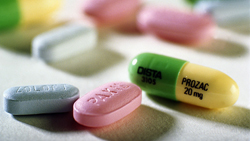Mercola.com – January 16, 2014
By Kelly Brogan, MD
When I see new patients, I do not prescribe medication for them. Patients who come to me know that I plan to help them understand “why” they are experiencing “what” they are going through.
Once I have tapered patients off of medication, we use alternatives if symptoms crop up again.
Knowing my basic orientation around the issue of psychiatric prescribing doesn’t seem to stop some patients from asking for what they believe will be a quick fix in an antidepressant pill. Where did they learn to make these treatment requests of providers?
Perhaps they are a reflection of the 49% of requests for drugs prompted by “direct-to-consumer” (DCA) advertising by pharmaceutical companies. Fully 7 out of 10 times, doctors prescribe based on these requests made by patients who learned from advertising that they have an “imbalance” that must be fixed with a pill.
In a 10-year period from 1999 to 2008, DCA tripled from 1.3 to 4.8 billion dollars devoted to educating patients about their need for psychiatric medication. The “mass provision” of SSRIs to the public is not a reflection of their well-understood mechanism, of their efficacy, or of their safety. In fact, it flies in the face of all three.
As stated by Professor of Neuroscience, Elliot Valenstein: “What physicians and the public are reading about mental illness is by no means a neutral reflection of all the information that is available.”
Reasoning Backwards: What Are We Treating?
If you were to ask the average person on the street what the biology of depression relates to, they would very likely parrot, “serotonin deficiency.” This hypothesis, referred to as the monoamine hypothesis, grew out of observations of mood-related side effects in the treatment of tuberculosis patients with iproniazid,3 which has some inhibitory impact on the breakdown of monoamines.
From this accidental observation and double talk about reserpine’s role in inducing and treating depressive states, a theory was born. Six decades of subsequent studies in never-medicated depressed patients have been conflicting, confusing, and inconclusive, and a critical review of the hypothesis concludes:
” … there is no direct evidence of serotonin or norepinephrine deficiency despite thousands of studies that have attempted to validate this notion.”
Similarly conclusive is a New England Journal of Medicine review on Major Depression, which stated:
” … numerous studies of norepinephrine and serotonin metabolites in plasma, urine, and cerebrospinal fluid as well as postmortem studies of the brains of patients with depression, have yet to identify the purported deficiency reliably.”
Even in the pursuit of this appealingly reductionist idea of a chemical deficiency, we are unable to measure central nervous system quantities, to account for the inner workings of 14 different types of serotonin receptors,
Also for the vast projections of serotonin trafficking neurons, and for the delicate interplay between the 100 some neurotransmitters that we know to be active in the brain. Dr. Daniel Carlat, author of Unhinged, writes:
“We have convinced ourselves that we have developed cures for mental illnesses…when in fact we know so little about the underlying neurobiology of their causes that our treatments are often a series of trials and errors.”
Read the rest of the article here: http://articles.mercola.com/sites/articles/archive/2014/01/16/dr-brogan-on-depression.aspx


